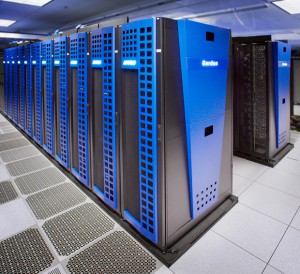Overview
Academic Computing Services provides Vassar faculty, staff, and students whose computational needs are not sufficiently met by the resources available to them in their lab or department with high performance computing support. There are several different types of systems available, both on and off campus, for those in the Vassar community requiring more powerful computing resources and technical support. A consultant is available to work with you to determine the most appropriate resource to match your project needs and assist with obtaining access to those resources.
Vassar’s High Performance Computing Cluster
Vassar has its own high performance computing (HPC) cluster, known as Junior. It is housed on campus and is managed by the Asprey Center for Collaborative Approaches to Science. The cluster consists of a head node and three compute nodes running the Ubuntu 14 operating system.
Junior hosts a suite of software, including the following:
- MATLAB: high-performance language for technical computing and visualization
- R: software environment for statistical computing and graphics
- BEMPP: Galerkin boundary element library for Laplace, Helmholtz, and Maxwell problems on bounded and unbounded domains
- AcouSTO: BEM solver
- Stacks: software pipeline for building loci from short-read sequences
- Open MPI: open source Message Passing Interface implementation
- Gaussian: state-of-the-art capabilities for electronic structure modeling
- Julia: high-level, high-performance dynamic programming language for technical computing
- IPython: provides a rich architecture for interactive computing
For more information, contact ACCAS Director Joe Tanski or Systems Administrator for High Performance Computing Jesse Hayward.
Off-Site High Performance Computing

Gordon supercomputer at the San Diego Supercomputer Center.
The Advanced Cyberinfrastructure Coordination Ecosystem: Services & Support (ACCESS) ACCESS is a program established and funded by the National Science Foundation (NSF) to help researchers and educators utilize the nation’s advanced computing systems and services. Almost any computer application that requires more than a desktop or laptop could qualify as needing an advanced computing system. Examples include supercomputer applications, AI and machine learning, big data analysis and storage, and others. For more information on available systems and support, see “What resources and services are available through ACCESS?” in the FAQs on the ACCESS About page.
ACCESS allocations are available to any researcher or educator at a U.S. academic, non-profit research, or educational institution. The primary eligibility consideration is that the work is intended for publication or other appropriate forms of scholarly dissemination. See the ACCESS eligibility section of the allocations policy page for more specific information on elegibility requirements.
There’s three steps to get starting using ACCESS:
- Create an account
- See what resources are available
- Prepare and request an allocation
Visit the get started page to begin the steps. If you have questions or need assistance, please contact Jesse Hayward, Systems Administrator for High Performance Computing.
Amazon Web Services
 Amazon Web Services (AWS) provides on-demand computing resources and applications via the internet, with pay-as-you-go pricing. For projects requiring either short-term or intermittent computing needs, AWS may be the right solution. Academic Computing Services, in consultation with the CIS Cloud Services Architect, can help you get started with Amazon Web Services.
Amazon Web Services (AWS) provides on-demand computing resources and applications via the internet, with pay-as-you-go pricing. For projects requiring either short-term or intermittent computing needs, AWS may be the right solution. Academic Computing Services, in consultation with the CIS Cloud Services Architect, can help you get started with Amazon Web Services.


